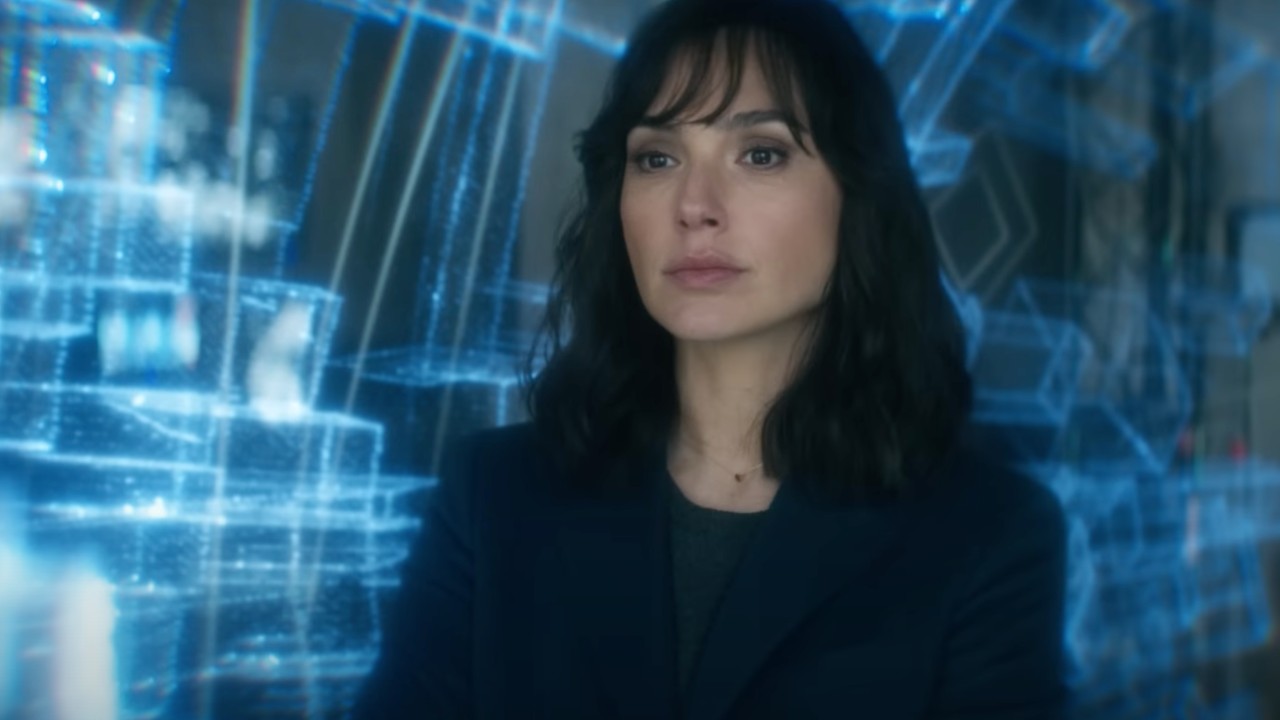I’m not a particularly big fan of Christopher McQuarrie’s Mission: Impossible – Dead Reckoning Part One from earlier this summer, but I can appreciate the macro metaphor it presents about modern Hollywood. In featuring Ethan Hunt in a fight against a powerful artificial intelligence called The Entity, the movie is essentially a showdown between Tom Cruise, the champion of big, bold, and practical cinema, and homogenized artifice of the digital age. The plotting is thin at best and it doesn’t compare well its predecessors in the franchise, but it does all the same make an effective statement about the power of “real.”

Release Date: August 11, 2023
Directed By: Tom Harper
Written By: Greg Rucka and Allison Schroeder
Starring: Gal Gadot, Jamie Dornan, Paul Ready, Jing Lusi, Alia Bhatt, Sophie Okonedo, and Matthias Schweighöfer
Rating: PG-13 for sequences of violence and action, and some language
Runtime: 122 minutes
Arriving almost exactly one month later and attempting to offer a counterpoint is director Tom Harper’s Heart Of Stone. A thorough knockoff of Mission: Impossible, the movie has its own clandestine organization full of superspies that monitors threats around the globe, but the hook with The Charter is that every move they make is dictated by The Heart, an artificial intelligence that has eyes on every inch of the planet, has access to every computer and is advanced enough to calculate any action’s odds of success. A dedicated agent for The Charter, Gal Gadot’s Rachel Stone doesn’t actually differ all that much in philosophy from Esai Morales' Gabriel in Dead Reckoning, and the film argues so strongly early on in favor of The Heart’s strictly utilitarian, logic-only morality that you expect it to be the starting point for a twist, but that twist never comes.
It demonstrates a shocking lack of any kind of feel for the zeitgeist regarding technology, though that’s just one issue with the new Netflix release. Perhaps it’s an influence from the film’s pro-artificial intelligence stance, but the whole feature feels like it’s been pumped out of a computer – the two hour runtime full of stilted, exposition-ridden dialogue, a trope-packed story with confounding worldbuilding and blue screen/VFX-heavy action.
Opening in the mountains of Italy, Heart Of Stone introduces Rachel Stone as a “stay in the van” MI6 agent working with a team (Jamie Dornan, Paul Ready, Jing Lusi) to take down a powerful arms dealer (Enzo Cilenti), but unbeknownst to them, she has her own objectives dictated by The Charter. When the mission goes wrong and MI6’s communications are hacked, the unit identifies and targets the person they believe is responsible, a woman named Keya Dhawan (Alia Bhatt), but their effort to find her leads them directly into a trap. When the agents are attacked, The Heart dictates that Rachel should abandon them rather than risk blowing her cover/death, but she does the human thing and tries to help her friends.
This emotional decision turns out to be the wrong one. Not only does she ultimately not save lives, but she reveals the existence of The Charter, is betrayed and puts her entire organization in danger by putting The Heart at risk. Bouncing back, Rachel tries to mend things by going after Keya and the traitor – who are hoping to steal the godlike artificial intelligence and use it for revenge against both a powerful pharmaceutical billionaire and the group of shadowy figures who control The Charter.
Heart Of Stone has a surprising approach to the subject of artificial intelligence.
The whole thing is so backwards that you could dub “The Entity” over every mention of The Heart and “The Syndicate” over every mention of The Charter, and Heart Of Stone would mostly work as a villain-centric story set in the Mission: Impossible universe (and instantly be recognized as the worst film in the franchise). I suppose you could give the movie points for originality as far as it being a pro-A.I. story in the same medium that brought us The Terminator and 2001: A Space Odyssey, but it’s a challenging perspective that throttles the story. It’s usually a good thing when a film presents antagonists who have reasonable and relatable motives and points of view, but things get thrown out of whack when the characters being presented as villains are arguably more reasonable and relatable than the heroes.
With cringy dialogue, endless exposition and rough worldbuilding, Heart Of Stone's script is a mess.
If the strange morality doesn’t get to you, the eye roll-inducing dialogue will. The concept of subtle exposition is an alien one to Heart Of Stone, which seems to use every blunt approach to info dumping that is possible – from exclamations like, “I can't believe it – Europe's most wanted arms dealer seen for the first time in three years!” to Rachel talking to herself at full volume in an empty room while typing away at her computer. And the only thing worse than the characters regularly explaining everything are the constant failed reaches for something resembling witty banter.
The bad dialogue hinders the development of interesting personalities, which means that the whole movie is driven by plot over story. It can’t even execute interesting worldbuilding without tripping over itself: for example, The Charter is split into different divisions named after playing card suits, and Rachel is designated the Six Of Hearts – which is just needlessly and pointlessly redundant with the name of the A.I.
Heart Of Stone adds to Netflix's catalogue of "Action Movies So Formulaic That They're Boring"
Netflix has produced solid action movies in the past (The Old Guard is solid, and I give both of the Extraction films a pass), but Heart Of Stone shares much more in common with The Gray Man and Red Notice: big films with solid budgets, marquee names and far-flung set pieces that are so ridiculously formulaic that they are rendered boring. The new Gal Gadot feature is terrible in other, more interesting ways as well, but the end result isn’t worth your time or attention regardless.

Eric Eisenberg is the Assistant Managing Editor at CinemaBlend. After graduating Boston University and earning a bachelor’s degree in journalism, he took a part-time job as a staff writer for CinemaBlend, and after six months was offered the opportunity to move to Los Angeles and take on a newly created West Coast Editor position. Over a decade later, he's continuing to advance his interests and expertise. In addition to conducting filmmaker interviews and contributing to the news and feature content of the site, Eric also oversees the Movie Reviews section, writes the the weekend box office report (published Sundays), and is the site's resident Stephen King expert. He has two King-related columns.











